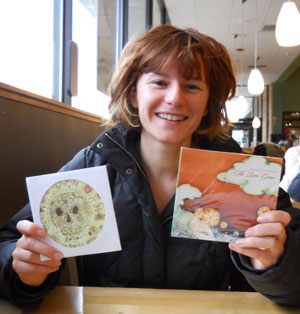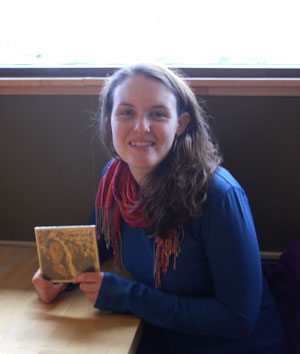
Somerville singer-songwriter Jenee Halstead
By Ashley Taylor
“I feel like when I entered into the music industry—which was in 2008, I released my début CD—the industry had already started to fall apart or crumble. It was a very strange time to enter,” said Somerville singer-songwriter Jenee Halstead of her experience independently recording and releasing a folk album, “River of Grace.” “Initially, I made the CD with the hopes that someone would either pick it up and be interested or would launch me onto a label for second album.”
Halstead did end up with a record label, but her story is a far cry from predictable. Whether you call it crumbling or simply changing, the music industry is not the way it used to be, when albums were produced only by record companies and were physical objects sold in stores. Now, as Halstead put it, “Anyone can record an entire album on GarageBand [the recording program that comes with Apple computers]. If it’s good, it’s good, period.” Labels once provided clout and funding for musicians. The role of the label is changing, and people are using technology to do themselves what labels might have done for them in the past.

Singer-songwriter Danielle Doyle
Foremost in recording and releasing an album is the question of start-up money, which medium-sized record labels don’t even provide consistently, and which independent musicians have to raise themselves.
Halstead recorded her first album, “River of Grace,” in a professional studio, but without a label. The money—over $8,000 to record, pay musicians, mix, master, and print the CD—came out of her pocket. On the other hand, she recorded her second album, “Hollow Bones,” live at David Piper’s studio in Union Square, Streetlight Sound. Piper donated his studio time.
Singer-songwriter Danielle Doyle, who works for a music booking agency in Davis Square, recorded her first album, “the Cartographer’s Wife,” at Hi-N Dry Studio, in the basement of the Armory building on Highland Avenue. She saved money on the project by recording the songs live, rather than creating a track for each part, as musicians sometimes do. “It creates a different feel, but it’s also an economic choice,” Doyle said.
Doyle spent about $4,000 to produce her first “run” of CD’s (1000 copies). After a year of selling CD’s at shows and online, she has almost broken even, selling the CD in-person and online. The one place she doesn’t sell her CD is in a record store. She considered selling CD’s on consignment but abandoned the idea after she found out the unsold CD’s might just be thrown away.
Doyle usually sells her CD’s at shows for $10 each. Halstead sells her first album for $10 and her second, which is shorter and lower-budget, for $5.
Both musicians also sell on iTunes, Amazon, and CD Baby, which describes itself as “the largest online distributor of independent music.” One can order physical CD’s from either artist for $19 (Amazon), $12.97 (CD Baby) or download full albums for $8.99 (Amazon, Doyle only), $9.99 (CD Baby and iTunes).
“As a musician, you don’t want people buying your CD on iTunes, you make like no money from iTunes,” Doyle said. She gets $5 or $6 each time someone downloads her CD from that site, whereas she could net $9, not counting production costs, from selling a physical CD, which costs a dollar to print, at a concert.
On the other hand, she added, money is not her top priority. “As a musician, you just want people to leave with your CD in their hand. As long as you’re making more than four dollars per CD, it’s a nice tradeoff. Really you just like to see people with your CD in their hand as they’re walking out the door. That means they liked what they saw and they wanna listen to it, and hopefully, they’ll share it with a friend, and then the friend will come out next time.”
In the same vein, musicians put their music out there for free through websites such as Myspace, YouTube, and the newer SoundCloud. Of all the social-networking sites, Halstead says, “I love facebook; I tend to use that the most. It feels the most personal to me, in some ways.” On the other hand, she says, “I never even log into Myspace anymore.” For her, it is paramount that various social networking sites be able to “sync up,” so that information she posts on one site, such as tour dates, gets updated on every site.
Halstead is only starting to get into SoundCloud, a website where musicians can post and even record their music. “I think SoundCloud is probably next Myspace,” she said. Unlike Myspace, SoundCloud lets people imbed songs anywhere, make comments on music the way people comment on facebook posts, and access the website through an iPhone app. SoundCloud does what Halstead wishes Myspace could do: sync to other websites. Users can set SoundCloud to automatically post uploaded tracks or tracks marked as “favorites” to my Myspace and Twitter.
So what is the value of a label? On one hand, Doyle commented that, “Labels aren’t what they used to be, and there’s still, like, the huge top 40 label companies, but the small ones aren’t really doing that much, and they don’t have that much money to really help artists, and there’s not the same sort of tour money that they used to have…and it would be such a long shot.”
Halstead agreed, commenting that, “Smaller to medium labels help more with distribution but don’t necessarily have a budget for actual recording.”
Yet Halstead, who recorded and released two albums independently, now has a contract with a European label, Continental Record Services. Continental combined her two CD’s into one and distributes those CD’s with their label in Europe.
“There’s still advantages to being on a label,” Halstead admitted. “It can help get you into a different plateau of recognition; it’s easier to get booked and play in better clubs.”
Through the worldwide web, music spreads around the world like everything else. After she saw that many of the people who bought her album on CD Baby were Dutch, she decided to tour the Netherlands. Now she has a record contract in Europe. Doyle had a similar experience: “They’ll tell you when somebody bought your CD and where they’re from, and I’ll get a lot of people from the Netherlands and you wonder how they found out about this, or Japan, and all these weird places, which is really nice – you’re like ‘oh, somebody in Japan just bought my CD.’”
“It’s A Small World After All.” Download it from iTunes for $0.99.















Reader Comments